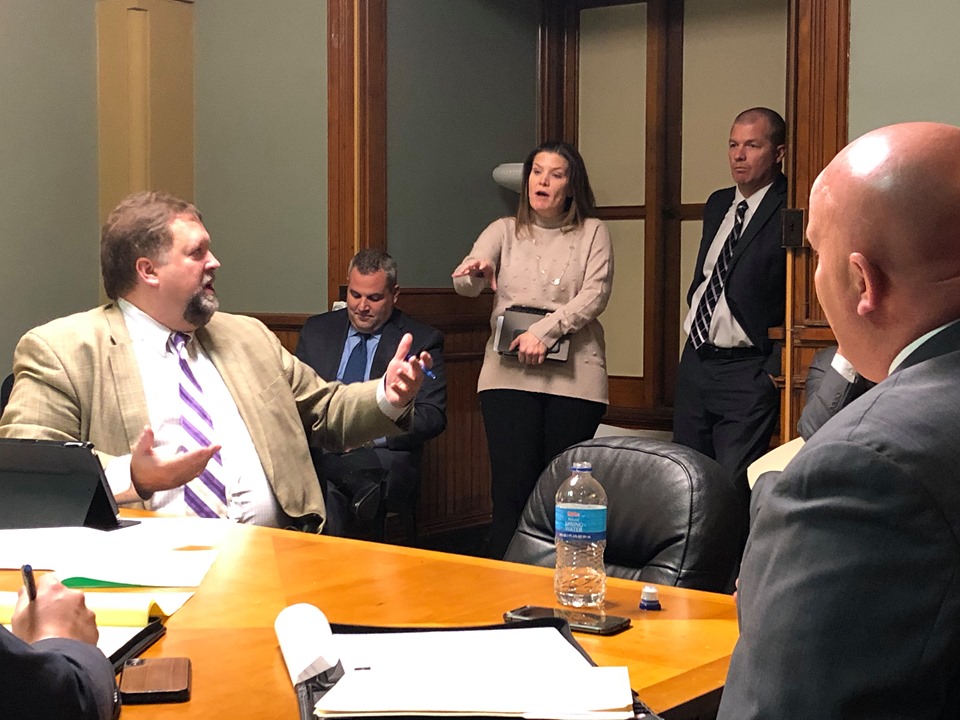FRUSTRATED WITH FAKE NEWS? THIS IS YOUR CHANCE TO DO SOMETHING ABOUT IT!
If you are someone who believes the media refuses to give a fair shake and just report the facts, then consider supporting The Iowa Standard.
The Iowa Standard is a free online news source so we can reach as many people as possible. But we need to raise money! We are asking our readers to help support us as a news alternative entering 2020. If you could, please consider showing a sign of support to The Iowa Standard by making a contribution here. Or, you can use Venmo and make a contribution to @Iowa-Standard-2018.
You could also send a check to:
PO Box 112
Sioux Center, IA 51250
Three state senators listened to ideas on Thursday about legislation that would prohibit employers from entering into non-compete agreements with low-wage employees. Currently, the legislation states employees making 200 percent of the federal minimum wage could not be forced into entering a non-compete agreement.
“My hope here today was to hear different stories of noncompetes, how they worked, how they didn’t work, how they might be abusive, how they might be protective of business information,” said Sen. Jason Schultz. “I’m interested in getting as high of a wage as practical without intruding on legitimate business concerns.”
There are all kinds of employees entering non-compete agreements, and some will never reach the low-wage threshold.
“But they’re also disallowed from betting themselves or furthering their career because of noncompetes,” Schultz said.
Schultz speculated whether nondisclosure agreements would be better to use than non-compete agreements.
“We are not banning noncompetes, we’re not going to hurt businesses,” Schultz said. “We are going to make sure that Iowans have an opportunity to better themselves and further their careers, but not take things that are other peoples’ property.”
Sen. Todd Taylor suggested the issue is one he thinks could be addressed on a bipartisan basis.
Mike Gronstal spoke on behalf of the Iowa State Building and Construction Trades. He said the group would request adding apprenticeship programs to the bill.
Charlie Wishman, representing the Iowa Federation of Labor, said the group doesn’t think the bill goes far enough.
“I don’t think that any worker should be an indentured servant to any corporation in this entire state or this entire country,” he said. “I don’t think that’s right. If it’s an at-will employment state, I don’t think you can on the other side have this part of it as well. I’m not necessarily against a nondisclosure agreement if you have some sort of trade secret that you shouldn’t be able to transfer to another company. But again, no worker should be an indentured servant to any employer.”
Kellie Paschke of Iowa Association for Justice said it’s an issue that also affects middle and high-wage workers. For example, there is a pediatrician who took a job in Des Moines and three years into her job, she was required to sign a non-compete agreement to keep her job.
With a young family and school loans to pay, it wasn’t much of a choice. Now she cannot go anywhere else in the metro area.
“Those are the type of coercive acts that we’re starting to see,” Paschke said. “There’s a real trend across probably all wage earners. Noncompetes have their place certainly when you’re trying to hire an employee, but to ask somebody to sign it after already working there, after leaving another job, it’s very coercive.”
Brad Hartkopf of Iowa Association of Business and Industry, said the definition of a low-wage employee should have an exact figure, just in case the federal government raises the minimum wage.
Felicia Hilton said that young people are signing the agreements without understanding what they are.
“If you’re a young adult trying to get a job, you don’t even know these things are out there,” she said.
If the non-compete agreements are being signed, then Hilton suggested separating the document from the many other documents people fill out when they begin a job.
Schultz said he still wants to discuss the issue with employers. He agreed that the state shouldn’t tie itself to the federal minimum wage and that perhaps non-compete agreements should be capped to a two- or three-year period.
Paschke added that if someone voluntarily signed a non-compete and is terminated, the non-compete still applies.
Schultz said perhaps if it is a nonvoluntary separation then the non-compete agreement should be automatically terminated.












